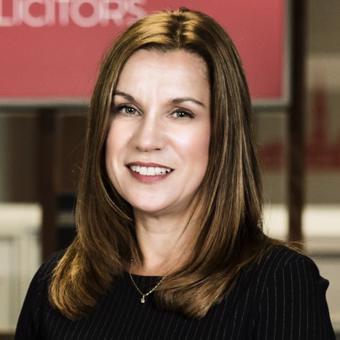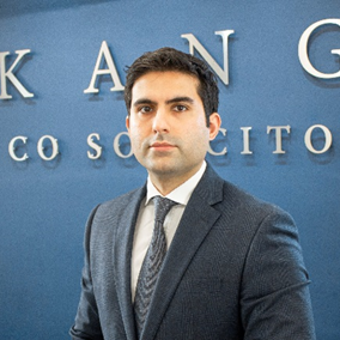James Morris is the founder of the boutique insurance practice Indemnity Legal, a firm which acts solely for policyholders to resolve complex, high-value or high-stakes disputes with their insurers. He shares a day in his life with The Brief.
I founded Indemnity Legal in 2020, when I spun my practice out of a top-tier boutique litigation practice where I previously worked. Our firm now has five partners, a senior associate and two associates, and we specialise in one niche: advising policyholders who are in the midst of complex, high-value or high-stakes disputes with their insurance companies.
Our clients are usually SME/large businesses (in the UK or abroad), company directors or high-net worth individuals who are in a situation where either a claim has been declined or an allegation of misrepresentation, fraud or a breach of the terms of their policy has been made against them.
Changing sides
There are few lawyers specialising in our field, but amongst them we’re unique because we have all “changed sides”: we all used to work for firms acting for insurance companies that were disputing claims, and we now use that inside track to build strategies to resolve complex claims with an understanding of how our opponent is likely approaching a dispute and where matters are likely to end up.
The goal for our clients is reaching that resolution as quickly and cost-effectively as possible, with as little disruption or unpredictability as we can achieve. The aim is always to avoid litigating against the insurance market, not least because insurance is built upon relationships: the client might still be insured by the insurer, and their broker almost certainly has a commercial relationship with the insurer.
All of that can often be used to a client’s advantage, and (in the first instance at least) engaging with an insurer, on a level playing field, about its concerns is almost always the best way of trying to solve a complex problem or one with any urgency to it.
We’re a young firm, but we have big ambitions. Our goal is to become the go-to law firm for policyholders with three types of cases: complex work, high-value work and high-stakes work.
Sixteen firms are ranked by Chambers for what we do. Our ambition is to become the firm of choice when it matters, and when a deeper understanding of what your opponent might be thinking creates a strategic advantage.
Starting the day
My day typically begins at about 7.00 when my two-year old daughter, Beatrix, wakes us all up. After breakfast I am responsible for taking her to nursery, where I drop her off at about 8.30.
I then usually call into a café on the way to the office, where I spend 30 minutes or so going through emails that have arrived overnight, and deciding how to prioritise my day. I will deal with any “easy wins” and distribute tasks among the team, so that I can hit the ground running when I get to the office.
I usually arrive at the office at around 9.30 and check in with the team. I am officially based at our London office but, post Covid, we have embraced flexible working and I typically work from home, or our office in Sheffield, for at least one or two days a week.
The rest of our team have flexibility over where they work, so long as we’re maintaining the high-quality service levels our clients rightly expect of a leading boutique firm.
But there’s a balance to that which is now rightly a hot topic in the profession: post COVID, flexibility has become a valuable part of any firm’s approach to its team, but it is equally important to ensure that remote working does not mean the team, and particularly junior members of it, feel isolated or that we lose our collaborative culture or other benefits of being physically together.
Casework and management
Once I settle into the office, two days are rarely the same. As managing partner of a boutique firm, I am responsible for my caseload as well as HR, compliance, PR and marketing, operations and all the other things that go into running a business.
Typically, I will divide my time equally between casework and managing the firm. This varies from day to day, of course, but yesterday provides a good representative variety of matters and tasks.
First, I spent a couple of hours advising a Chief Financial Officer on how best to present a £1 million-plus defence costs budget to an insurance company funding the defence of a very complicated claim.
We had secured cover for that claim for the company some time ago when it was disputed, but one of the most common disputes once that happens is the scope of any cover and disagreements about the size/form of a costs budget. We ensure those disputes don’t arise by getting things right up front.
Referrals
I then attended a meeting with a medium-sized regional law firm whose client is in dispute with a leading international insurer for whom that firm also acts. Both clients are important to them, and they needed a sensible firm to refer the corporate client on to, who could pursue the insurance recovery uncompromisingly but with a solid grounding in what should or shouldn’t be covered and how best to tackle a dispute firmly, while remaining respectful of the relationships involved.
We receive referrals from many law firms for that reason, including a good number of Top 100 firms who have been asked by their clients to act against insurance companies, but either have no specialism in that area or a conflict of interest.
Referrals from other law firms, of all sizes, are a major source of work for us. Because of this I spend a lot of time meeting and building relationships with managing partners and heads of department in order to provide them and their clients with a solution when conflicts arise or genuine specialism is required. It’s a model that works really well for us and the referring firms.
After this meeting, I took a call from a prospective client who had been referred to us by a law firm that advises insurance companies and would have been conflicted in this case. The clients – who have now engaged us formally – had a factory that was destroyed by fire, causing over £5 million of property damage and business interruption losses.
Their insurer refused to cover the claim, alleging a variety of breaches of the policy’s terms and misrepresentations in the proposal form used to elicit the insurance. We have now been instructed to challenge the insurer.
I then had lunch. I usually just have lunch at my desk at around one o’clock, and it’s rarely more interesting than some tasty soup and crusty bread.
Working with brokers
After lunch, an insurance broker (brokers are another primary source of referred work for Indemnity Legal) emailed me to say that a large claim for one of their key clients had been declined.
I reviewed the papers, considered that the insurer had likely reached the incorrect decision, and advised the broker on what they should say to challenge the position. We provide lots of free advice to insurance brokers with a view to seeing if the involvement of lawyers can be avoided altogether.
If the broker can’t resolve it themselves, the client will be referred to us to act against the insurer, but the first aim is always to see if the market can be persuaded to do the right thing without a dispute escalating.
Litigation
After responding to the broker I spent some time considering a consent order for a claim we have recently settled in the County Court. Unusually, because we are typically the claimant, an insurance company had sued our clients to recover substantial sums paid out which the insurer then considered they should not have paid.
Our advice was that, in fact, the insurer had made a mistake and shouldn’t have paid the money but, because it was their mistake, they couldn’t recover the money from our client.
After a year of litigation, and with trial only a fortnight away, the insurer abandoned its claim entirely and agreed to pay our costs, so we had a very happy client.
Next up I had a short meeting with some of the team to prepare for a webinar we are planning, with the working title “Five reasons why an insurer might refuse to pay your claim, and how to avoid them.”
Normally our webinars are aimed at law firms and insurance brokers to equip them with as much knowledge as we can, and to share as much of our experience on live cases as possible, to help them resolve disputes without involving us!
It’s counterintuitive, but it’s the right thing to do and there are plenty of disputes that can’t be resolved that find their way to us. Helping other professionals solve problems early is something we think is really important.
International clients
My last task of the day is to draft some advice to a foreign client who we are representing at arbitration proceedings in London. Lloyd’s of London is the global hub for insurance, which means that many clients who are based abroad and don’t do any business in the UK will nonetheless have taken out insurance policies that are subject to English law, or contain an arbitration clause that nominates England as the jurisdiction under which any proceedings must take place.
This one relates to a complex/high-value dispute around whether directors’ and officers’ defence costs are covered and involves all sorts of issues around consent, the capacity of the relevant directors, the application of exclusions and more. It’s a great case to work on, and it’s the sort of case where only genuine specialism can really navigate the issues.
Hard stop
I always finish work between 6.00 and 6.30 (whatever is happening) so that I can spend some time with Beatrix before her bedtime. I am responsible for bath time, and my wife puts Bea to bed at around 7.30.
That rigidity can cause pressure where we have a deadline at work, or where work is particularly busy, but having a 6.00pm hard stop set in stone means that I can better manage my obligations to both managing the firm and my family, and that my availability for family time is guaranteed.
I also believe it is important that I am seen to practise what I preach to colleagues, in terms of work/life balance – work should be fun, interesting and (at times) high-paced, but it shouldn’t come at the expense of time with family and friends, or time spent looking after yourself. It’s really important to us that our team have balance and that one part of their life doesn’t pull too much on the other.
Once Bea is asleep, I will put on some dinner for me and my wife and log back on to work. We eat quite late, but with the hectic day beforehand (and if either of us has to do a little more work later on), eating late means we always have a couple of hours or so to spend together in the week whatever else might be happening.
Visit
Connect with James Morris via LinkedIn











